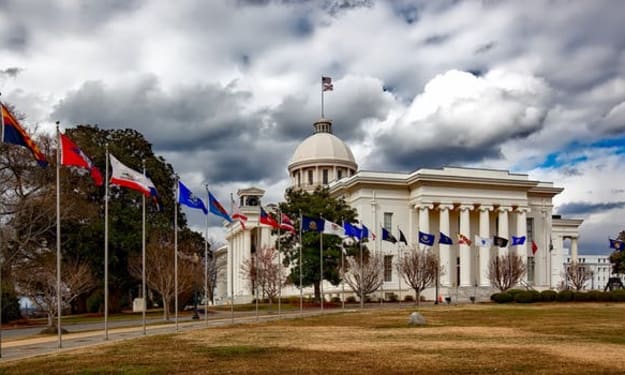Innovation; The Unknown Alliance Between Business and Government
Political Capitalism

Milton Friedman’s view in Capitalism And Freedom proposes the idea that government should exist in the market solely to maximize unconstrained economic freedom. Government intervention into the marketplace that limits or forces consumer decision-making cannot be justified. Friedman’s argument for market fundamentalism is seemingly at odds with the historical reality of the role of government in the United States. From state police powers, to Progressive Era reforms, through the New Deal government whether being state or federal has always shaped the contours of capitalism through political, social, and cultural change. Friedmans point of view differs from the consumer health and environmental protections era (1964-1977) and the rise of the idea of the developmental state. Friedman’s philosophy has guided the idea of market fundamentalism within the false notions of the invisible hand driving innovation instead of a combination of public and private sectors. This idea is negligent to the fact that government presence in the innovation economy acts as the only entity that can invest in certain sectors. The notion that the government shouldn’t pick winners is supplanted by the idea of the government supporting large, medium, and small firms to compete for the best technology.
Friedman makes explicit that government intervention can only be rational under two conditions. The first is substantial neighborhood effects which he describes as, “circumstances under which the action of one individual imposes significant costs on other individuals for which it is not feasible to make him compensate them, or yields significant gain that make voluntary exchange impossible.” Essentially, the government in this view is only able to justify intervening in situations that would benefit society as a whole by making better citizens. Or in the case of someone else’s choice limits your ability to choose freely. The only other possible justification for government intervention is under paternalistic implications for children and other irresponsible individuals. This is only for those Friedman describes as incapable of being responsible citizens and for children because they in turn have neighborhood effects, “I benefit if another man contributes to the care of the insane” Milton Friedman states to make clear where and when the government should intervene and why.
However, soon after Friedman wrote Capitalism and Freedom government intervention from 1964-1977 expanded focus on consumer rights, occupational health, and environmental protections. The Consumer Product Safety Act for example intervened by targeting products such as flammable children’s pajamas, phosphates, poisonous household cleaners, the presence of various chemicals and particles in the nation’s air and water. Certainly putting regulations on the options consumers had became a political issue from the 1960’s through the late 1970’s creating a huge impact on industry at large. This led to the creation of a multitude of bureaucratic agencies regulating how and what products are made. These newly created government agencies increased government expenses from $539 million to $5,036 billion accompanied by a massive increase in employment by the social regulation agencies. Bureaucracy was set to become an integral part of business through new laws that impacted marketing, personnel administration, plant location, research and development, and production. One point of view is that businesses didn’t appreciate the new interwoven bureaucracy that now involved all of their major decisions. But, the idea of the developmental state finds that even in times of intensifying or loosening of governmental social regulations on business they remain partners. Government continues to push industry forward through subsidies, finance, and research and development.
The developmental state is driven by economic innovation that offers a different notion than Friedman’s market fundamentalism or regulatory governmental policy and reveals the relationship between government and business. Instead of the binary arguments being proposed between government regulation being at odds with market fundamentalism; the two need each other to drive an innovation intensive economy, along with a key third aspect; the university. These three elements known as the “triple helix of innovation” is or already has been the leading force for research and development of government issued projects to then be turned over to industry and subsequently marketable products. The government driving innovation has its roots in the 19th century when the United States infrastructural planning i.e railroads, highways, bridges, etc. In 1901 the Bureau of Standards now known as the NBS was the first federal laboratory with expertise in the physical sciences with the purpose of spurring further industrial development such as telephone technology. Since then the public has experienced the increasing role of government behind huge technological developments whether or not it has been seen. According to Fred Block in Capitalism The Future of An Illusion states, “The United States, particularly over the past three decades, has developed a sophisticated and complex innovation system in which the government plays an absolutely central role.”
While government regulation and market fundamentalism have been adopted more or less in different times of the U.S political agenda as they depend on the social and cultural climate, one aspect has remained a constant; government has for the entirety of the United States history been in partnership with business in driving economic innovations. Even during the 1980’s Reagan era adoption of leaving the private market to its own functions would still embrace DARPA (Defense Advanced Research Agency), formed in 1955 still existing today, which has continued to play an essential function in updating the union between university, business, and government relations. DARPA, as opposed to those who wanted a centralized industrial policy or the free market fundamentalist philosophy that the Reagen era proposed, was instead a form of increasing the infrastructural power of the state through decentralizing into different agencies to aid in University lead research ideas. This accomplished having industrial policy power differentiated across agencies instead of having all policy decided in one despotic arena. This helped connect researchers at universities with businesses in order to turn their ideas into marketable products. The world economy has seen these technologies that get developed through “the triple helix of innovation” get turned into marketable items such as the computer, the internet, and the iphone all as a result of businesses cooperating with government and the university all aimed at propelling new innovations.
In more recent years similar developments have been seen under the Obama administration passing the American Recovery and Reinvestment Act in 2009 which allowed the Department of Energy to chase what is referred to as “blue sky ideas” that will make technological innovations that could like DARPA not be put to use for decades to come. Nonetheless, the idea that the state should and always has played a major function in driving innovation remains true. This intact decentralized partnership with university, business, and government is vital to the operations of political capitalism.
The developmental state goes far beyond the ideas of market fundamentalism or the policies of the regulatory state insofar as it pursues innovation as the key to keeping the United States competitive on the global stage. The Export-Import bank has shown to be something under scrutiny from modern Friedman followers who agree with Sen. Ron Paul’s claim that it is, “Corporate Welfare” by subsidizing some of America’s largest companies such as Boeing. However, on the flipside Boeing is the United States largest exporter and is an industry that without subsidies wouldn’t be able to compete against other global competitors. Government is the only institution that can and is willing to invest in unknown opportunities that lead to innovation or provide the proper funding for sectors that sell satellites, build nuclear plants, or small businesses to even be able to compete. In a vast amount of global projects an Export Credit Agency is needed. According to Kristen Hopewell in the Review of International Political Economy in 2017 reported, “Projects primarily in emerging markets, where bids will not be considered without the backing of an ECA” (Export Credit Agency). This is because no commercial bank can or is willing to put such high risk stakes in long-term risky development. This is a market that the U.S needs to be able to compete in order to stay competitive with the rest of the world and precisely where market fundamentalism and regulatory policy do not address the large scale drivers that will perpetually allow the United States to stay competitive with foreign industries in a time of declining U.S power. More so, when the United States doesn’t provide export agencies companies will solely move to other countries' export banks for subsidies that will not only keep the U.S from staying competitive but also give foreign competitors a stronger foothold. Therefore, it is in the United States direct interest to continually support businesses competing on the global scale and provide them with the tools that they need in order to compete. The idea of supporting these companies as corporate welfare is mistaken because of the fact that even large companies such as Boeing “Support a supply chain of over 14,000 other US companies employing 1.5 million people” according to Hopewell.
While Milton Friedman’s market fundamentalism philosophy is one that has been used as a veil for discovering innovations by increasing economic free choice or the alternative of business and government being at odds with one another over regulatory policies; a deeper truth beyond each of these viewpoints is that government and business have been partners through subsidies, funding, research and developments, and bringing foundational innovations with the right design to the marketplace. All of these reasons are more fundamental to the relationship between business and government working together to keep the United States a global competitor than the shallow perceptions of market fundamentalism or regulatory policy.
About the Creator
Schmalz
Welcome to my page! I am a writer whose interests are vast and believes in the art of the word. In my writing you will find Non-Fiction, Fiction, and poetry in pursuit of the value of language.







Comments (5)
Excellent points, well based.
Thank you for sharing, great write up!
Long knowledge again, thanks for sharing!
All of these reasons are more fundamental to the relationship between business and government working together to keep the United States a global... fact!!!
Very good